Top 40 Magazine Covers of the Last 40 Years
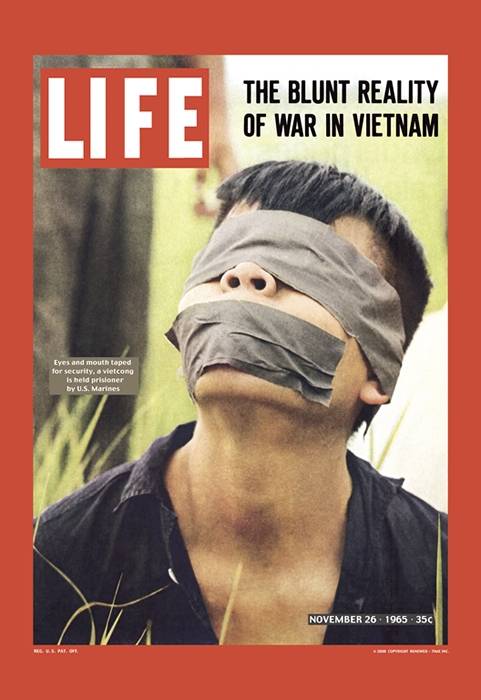 |
#21 LIFE (November 26, 1965)
"The Blunt Reality of War in Vietnam," appears on the November 26, 1965, magazine cover of LIFE. Paul Schutzer's photograph of a Vietcong prisoner with his eyes and mouth taped shut captured the tumultuous war. Schutzer was one of LIFE's best photographers, but was killed on assignment while covering the Six-Day War in 1967.
|
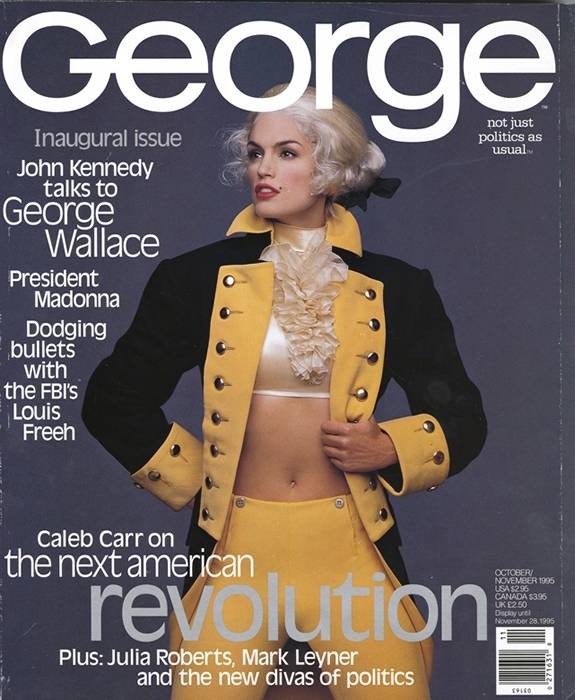 |
#22 George (October/November 1995)
The premiere issue of George featured supermodel Cindy Crawford on the cover dressed as George Washington. George was founded by John F. Kennedy Jr., and covered politics, current events, pop culture and celebrity news. In 1999, Kennedy was killed in a plane crash and consequently, George folded in March 2001.
|
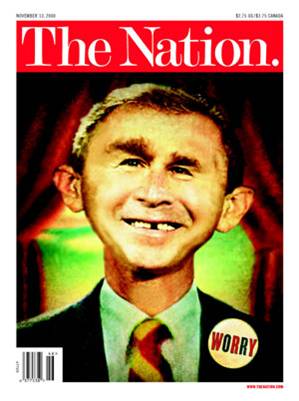
|
#23 The Nation (November 13, 2000)
This magazine cover of The Nation features artwork by Brian Stauffer that depicts George Bush as Alfred E. Neuman, the fictional mascot of the magazine Mad, complete with a button that reads, "What, me worry?" The U.S. presidential election was held on November 7, 2000, and when this issue of the magazine was released, the winner of the election was still unclear. The issue discusses what would happen to the country and the world if Bush became president, and in fact Bush was declared the winner of the election the next month.
|
|
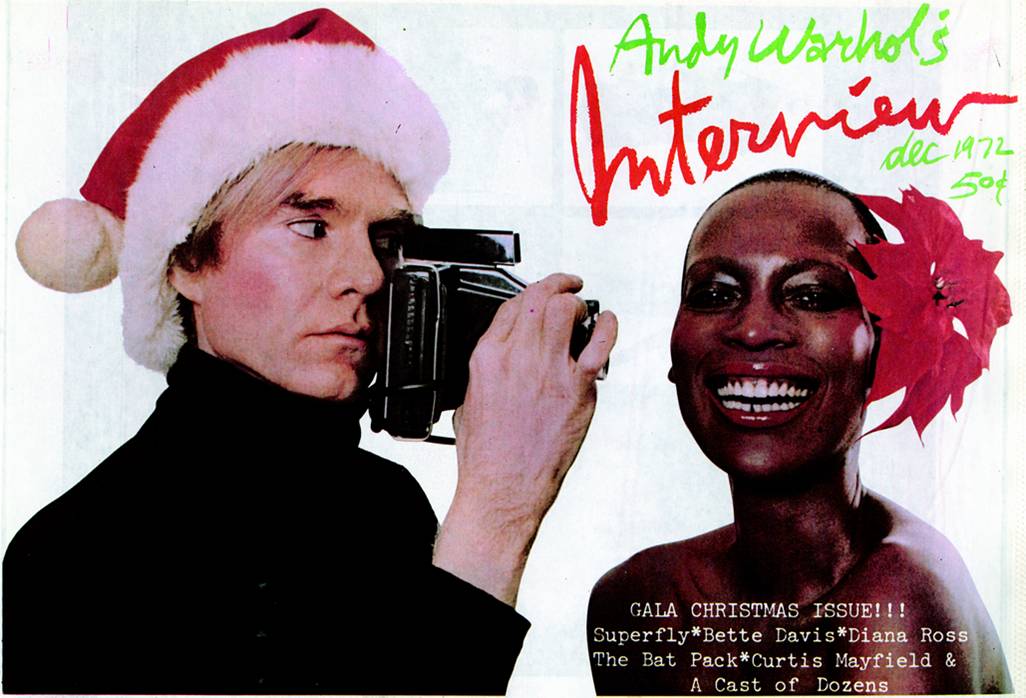
|
#24 Interview (December 1972)
This magazine cover of Interview was designed by Richard Bernstein and features Andy Warhol photographing model Grace Jones for the December 1972 issue. Warhol founded the magazine in 1969 and featured unedited interviews with celebrities along with photographs and striking ads.
|
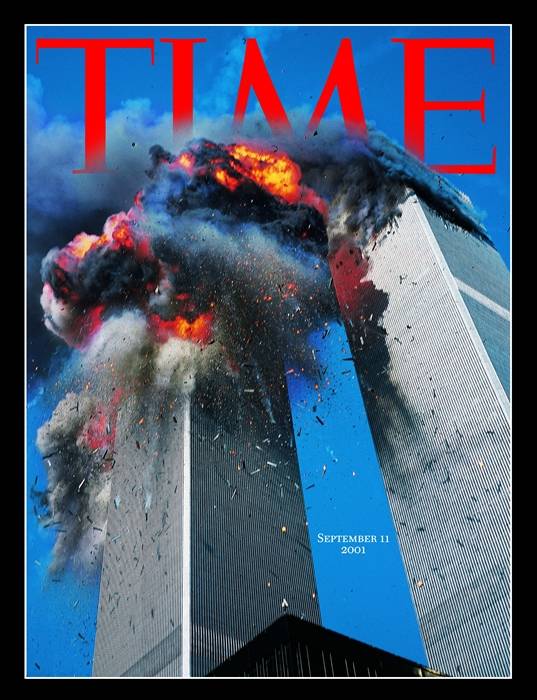
|
#25 TIME (September 14, 2001)
The magazine cover of the September 14, 2001, special edition of TIME features a photograph of the two hijacked airliners ripping through the World Trade Center towers on September 11, 2001, taken by photographer Lyle Owerkoof. The issue included testimonies from survivors, more photographs of the Twin Towers after the bombings, and a salute to all those who perished in the tragedy.
|
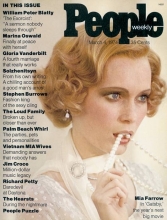
|
#26 People (March 4, 1974)
This premiere issue of People featured Mia Farrow on the cover biting a strand of pearls. Farrow was starring in the movie The Great Gatsby as Daisy Buchanan and the magazine cover dubbed Gatsby the year's next big movie. Since this issue, People has become a popular magazine of celebrity and pop culture news and is best known for yearly special issues naming The 50 Most Beautiful People, The Best and Worst Dressed and The Sexiest Man Alive.
|
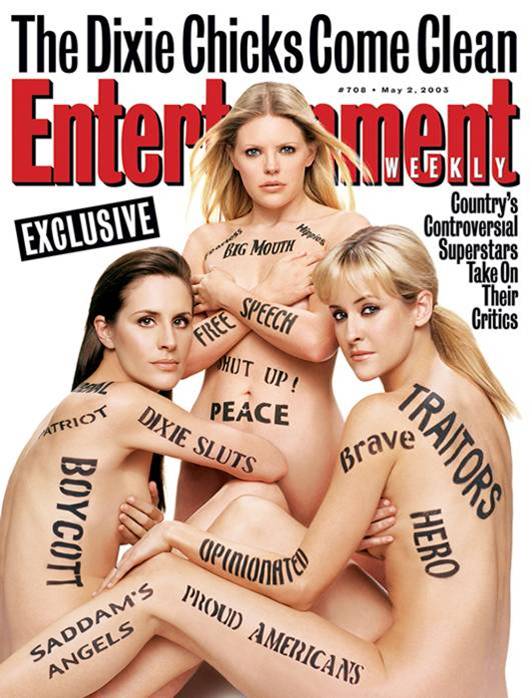
|
#27 Entertainment Weekly (May 2, 2003)
The Dixie Chicks appear naked on this magazine cover of Entertainment Weekly with slogans such as, "Boycott," "Traitors," "Hero," and "Proud Americans," printed on their bodies. Two months before, member Natalie Maines criticized the impending invasion of Iraq by President George Bush at a concert in London. This remark sparked intense criticism from many Americans who subsequently boycotted The Dixie Chicks music and concerts. In their interview with Entertainment Weekly, the group discussed their reaction to the criticism and what lies ahead for them in the country music industry.
|
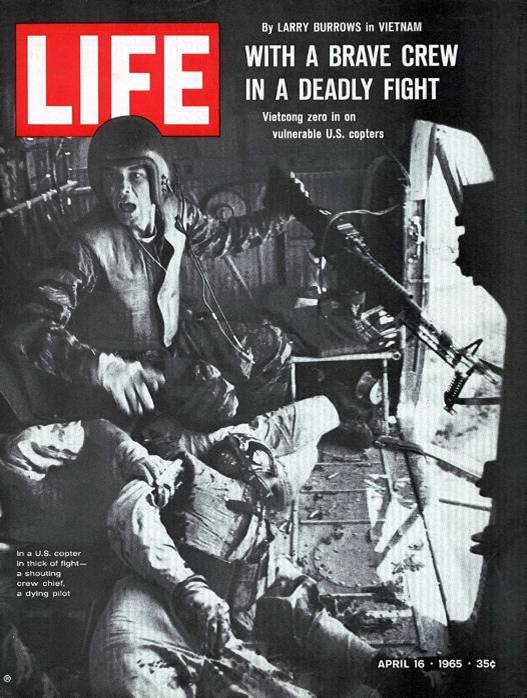
|
#28 LIFE (April 16, 1965)
This black and white photograph on the magazine cover of LIFE by Larry Burrows shows the Vietcong zeroing in on vulnerable United States' helicopters. The LIFE photographer had covered the war in Vietnam since 1962 and reported this article from Da Nang. On this day, Burrows accompanied a helicopter squadron on a mission where the pilot was killed and other members of the squadron were wounded. Burrows himself was killed in 1971 while on assignment in Laos when his helicopter was shot down by enemy fire.
|
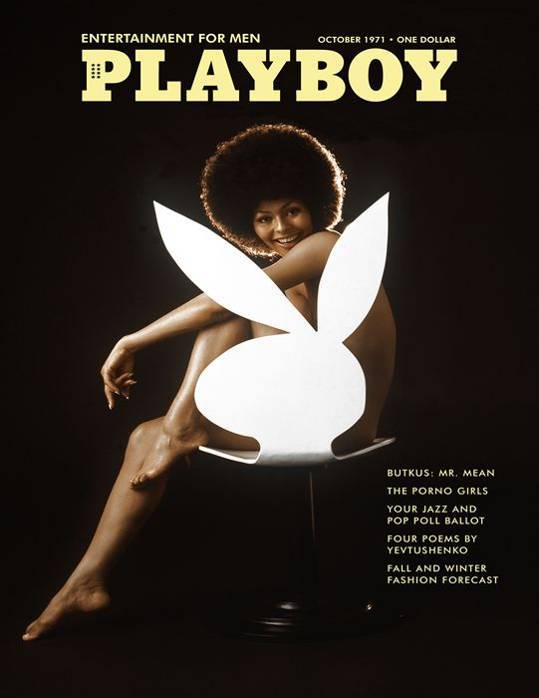
|
#29 Playboy (October 1971) (TIE)
r Richard Fegley took this photo of model Darine Stern sitting on a Playboy bunny chair for the October 1971 cover of the magazine. The idea came about when art designer Len Willis decided to create a chair using the famous rabbit head. Stern became the first African-American model to grace the cover of Playboy and the cover has become a classic for the magazine.
|
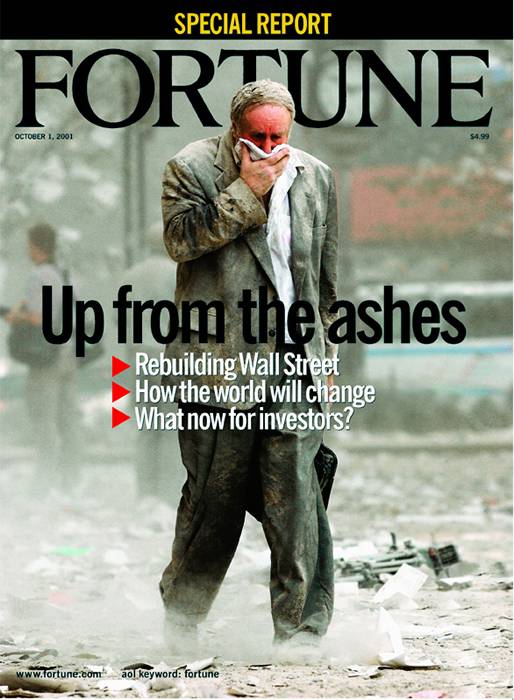
|
#29 Fortune (October 1, 2001) (TIE)
This special edition of Fortune, entitled, "Up From The Ashes," shows a man covered in ashes after the September 11, 2001, terrorist attacks. Published less than a month after the attacks, the issue discussed the economic ramifications of the September 11, 2001, terrorist attacks on New York City and the world.
|
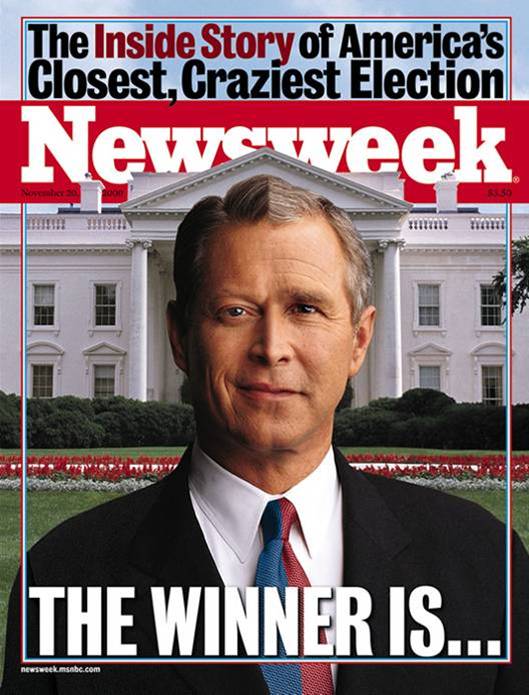
|
#31 Newsweek (November 20, 2000)
This magazine cover of the November 20, 2000, issue of Newsweek is entitled, "The Winner Is," with a photo of half George W. Bush and half Al Gore. The presidential election had taken place earlier that month, but there was still no clear winner declared because of the close ballot count in the state of Florida. In this issue, Newsweek chronicled the lawsuits, court challenges and endless counting of ballots. The following month, George W. Bush was declared the winner of the closest presidential election in United States history.
|
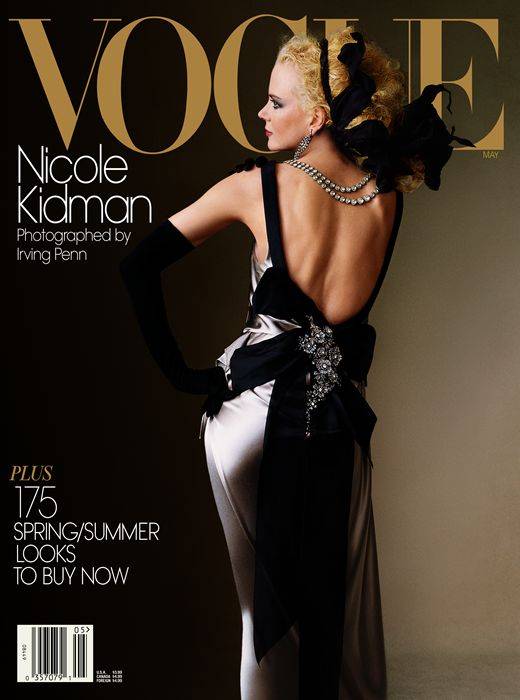
|
#32 Vogue (May 2004)
Photographer Irving Penn captures Nicole Kidman's back profile dressed in a Christian Lacroix oyster satin backless dress for this cover of the May 2004 issue of Vogue. This was the first cover shoot for Vogue by Penn since 1989. The issue contains more photographs of Kidman dressed as a Grecian goddess, an Italian diva and as legendary actress Sarah Bernhardt.
|
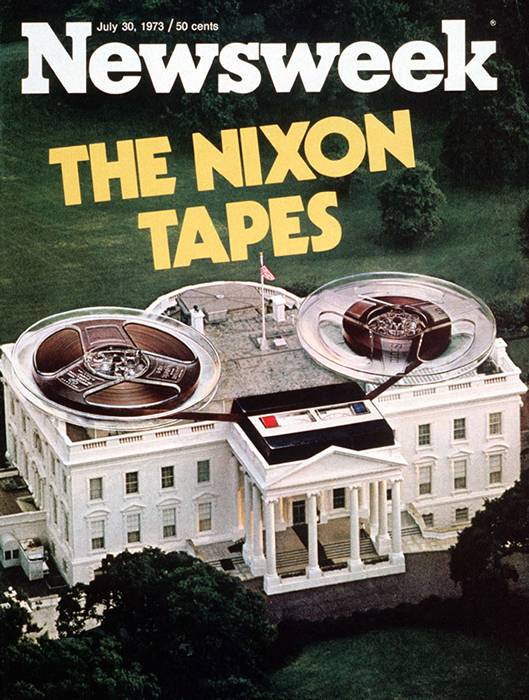
|
#33 Newsweek (July 30, 1973) (TIE)
This July 30, 1973, magazine cover of Newsweek, entitled, "The Nixon Tapes," gives an aerial view of the White House turned into a tape recorder. The article discusses how President Nixon had been secretly taping everything said in his offices and on his telephones for at least two years. The following year, the tapes were released and they proved Nixon was involved with the Watergate Scandal cover-up. In August 1974, Nixon announced his resignation and Gerald Ford became President. Ford later pardoned Nixon, immunizing him from prosecution for any crimes he may have committed as President.
|
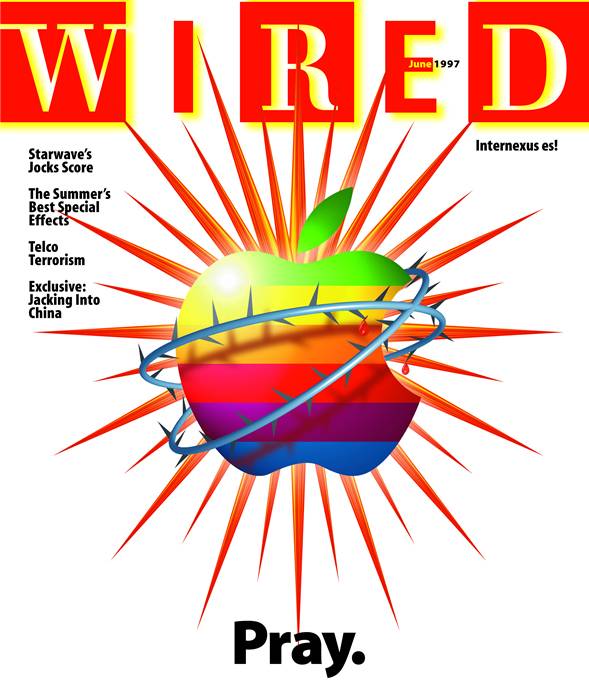
|
#33 Wired (June 1997) (TIE)
This June 1997 magazine cover of Wired is entitled, "Pray," with a picture of the Apple symbol covered in barbed wire. The article, "101 Ways to Save Apple," gave an assessment of what could be done to fix the once-great company. Steve Jobs and Steven Wozniak founded Apple Computer in 1976 when they introduced the Apple I. However, by 1997, Apple saw major competition from other computer companies and experienced economic troubles. Since that time, Apple has made a comeback, due in part to the tremendous success of the iPod.
|
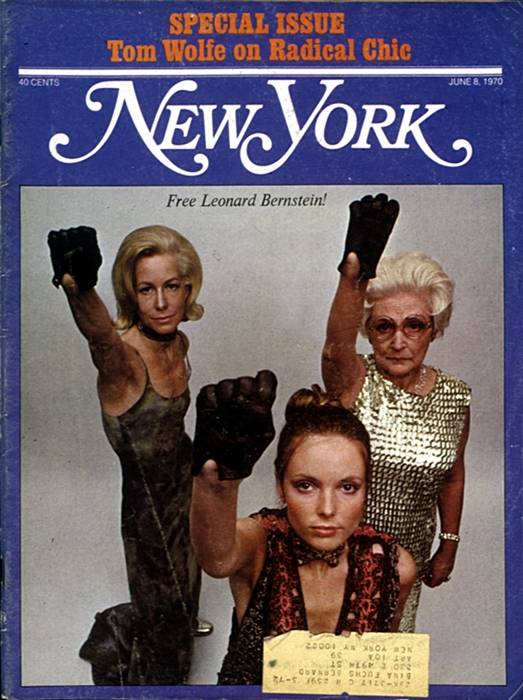
|
#35 New York (June 8, 1970)
This magazine cover of New York is entitled, "Free Leonard Bernstein," with a photograph of New York society women posing with fists upraised. Bernstein was an acclaimed American composer and orchestra conductor who was a presence on Broadway, in Hollywood, at Carnegie Hall and at the New York Philharmonic. He supported the Black Panthers and in 1970, held a fund-raising meeting for the organization at his apartment. The magazine cover was a jab at his association with the Black Panthers and their radical ideology.
|
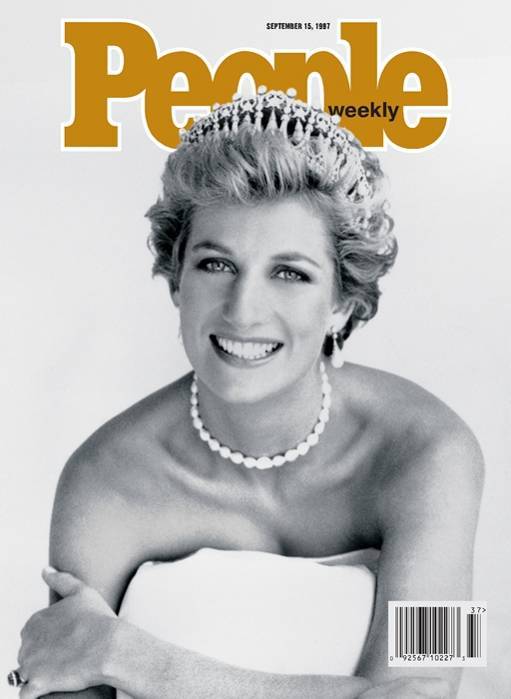
|
#36 People (September 15, 1997)
This cover of People features a black and white photograph of Princess Diana, and the issue is a tribute to her life after she was killed in August 1997 in a car crash. Diana appeared on the cover of the magazine a record 52 times and was one of the most popular People cover subjects. In 1981, she married Prince Charles and arguably became one of the most famous women in the world. She was lauded for her high-profile involvement in AIDS issues and for an international campaign against landmines. Diana's death was greeted with extraordinary public grief, and her funeral at Westminster Abbey drew an estimated three million mourners in London, as well as worldwide television coverage.
|
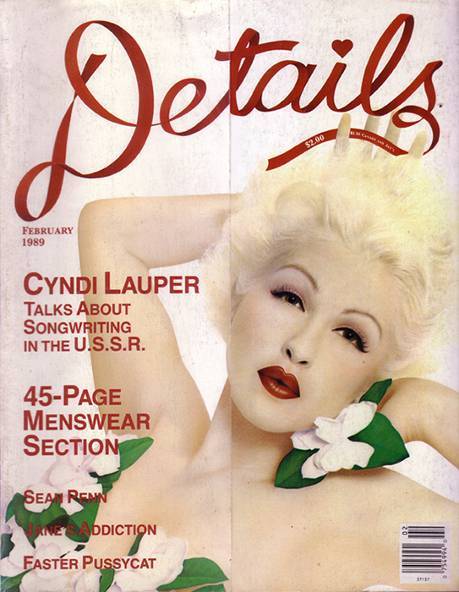
|
#37 Details (February 1989) (TIE)
This magazine cover of Details features a photograph of Cyndi Lauper sporting a classic Hollywood look. In the issue, Lauper discusses her songwriting and recounts her trip to the U.S.S.R. with a group of American songwriters the previous year to collaborate with Soviet counterparts. They produced the song Cold Sky, which appears on the album Action Speaks Louder Than Words.
|
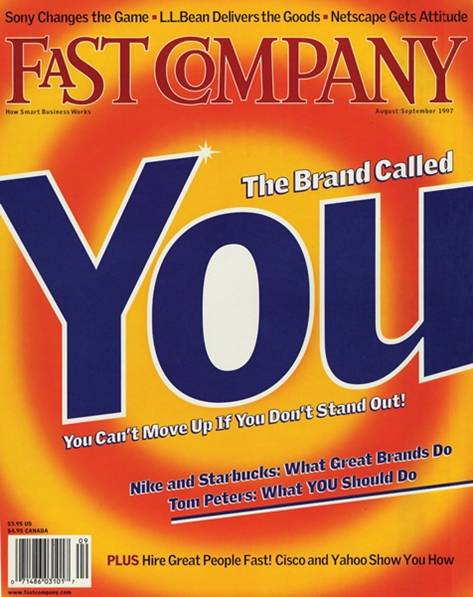
|
#37 Fast Company (August/September 1997) (TIE)
This magazine cover of Fast Company is entitled, "The Brand Called You," against the Tide background. In the cover article, author Tom Peters discussed how people can market themselves as brands to stand out and move up in their professional life.
|
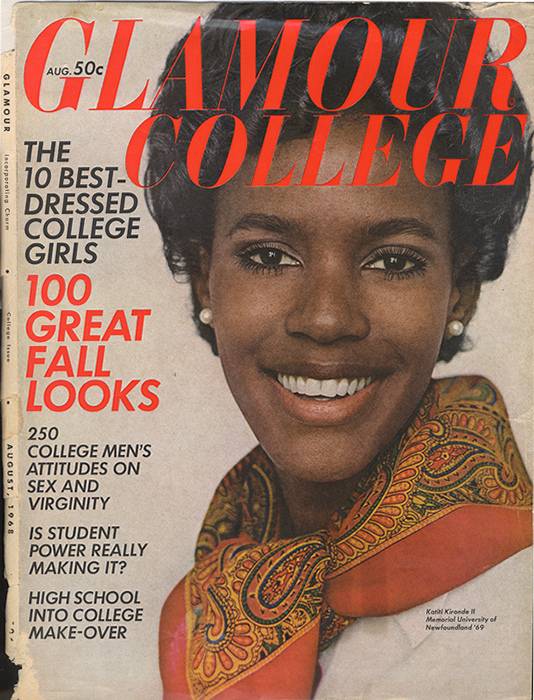
|
#37 Glamour (August 1968) (TIE)
This issue of Glamour model Katiti Kirondi II on the cover features, "The Best Dressed College Girls." This marked the first time an African-American woman appeared on the cover of a national women's monthly magazine. This issue featured the 10 best-dressed college girls and 100 great fall looks, which included mini-skirts and psychedelic colors.
|
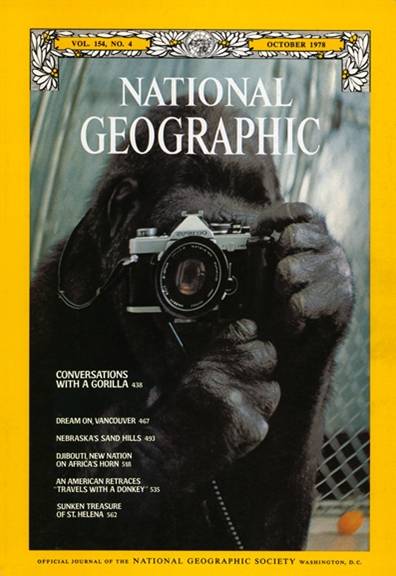
|
#37 National Geographic (October 1978) (TIE)
This cover of National Geographic magazine is entitled, "Conversations With a Gorilla," with Koko the gorilla snapping a photograph of her reflection in the mirror. The photo was of such high quality and significance that it was chosen to be the cover photo for the October 1978 National Geographic article featuring Koko. Developmental psychologist Francine Patterson spent six years with Koko teaching her sign language and this led Patterson and other researchers to believe Koko displayed evidence of linguistic capabilities.
|
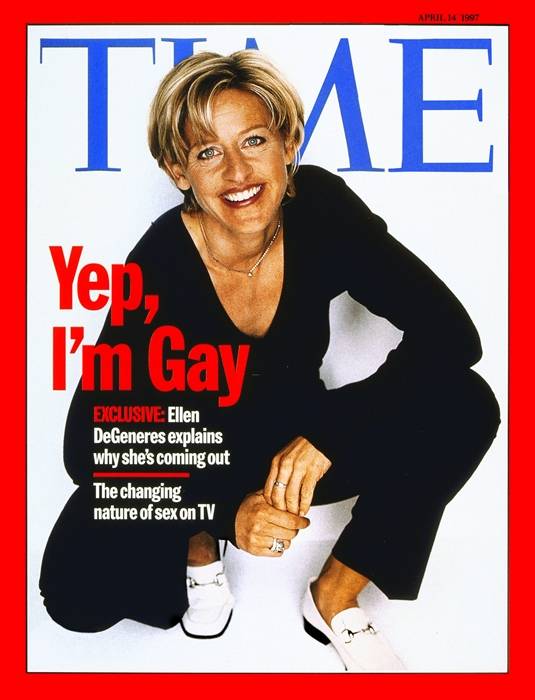 |
37 TIME(April 14, 1997) (TIE)
This cover of TIME magazine is entitled, "Yep, I'm Gay," with a photograph of Ellen DeGeneres by celebrity photographer Firooz Zahedi. In the April 14, 1997 issue of TIME magazine, DeGeneres spoke to writer Bruce Handy and admitted to him that she was gay and this made her televisions first openly-gay star. The television character played by DeGeneres on the sitcom Ellen also came out later that month and this was one of the most watched episodes of the series.
|
|